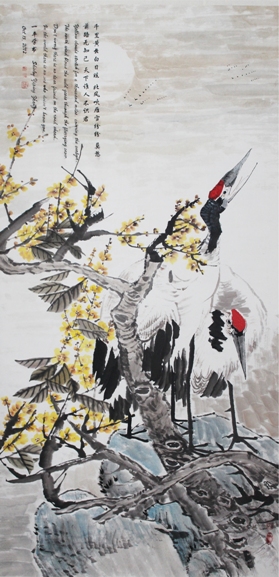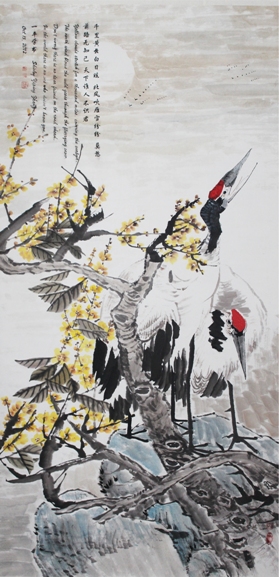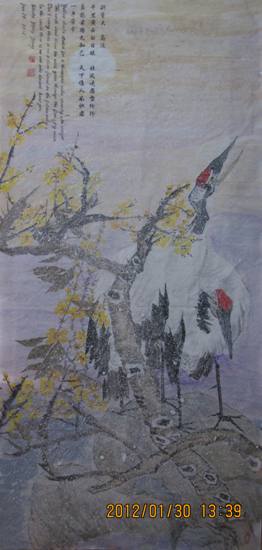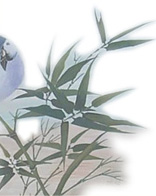|
|
|
 |
| |
|
|
|
[<<] [<] [>] [>>] |
| Title: Shirley's Art 706-Integrated Arts 74-A79 Painting , Music, Singing, Translation & Article for Chinese Classical Poem: Die Dongda by Gao Shi - Shirley's 98th Assignment of Chinese National Academy of Arts - June 8,2012 |
| Artist: Shirley Zhang |
| Size: 97cm x 180.00( 38.19inches x 70.86 inches) |
| Completed Time: June 8, 2012 |
Remarks:
 Listen to Shirley Singing the Poem in English & in Chinese June 2, 2012 Listen to Shirley Singing the Poem in English & in Chinese June 2, 2012
 Listen to Shirley Singing the Poem in Chinese & in English Jan 30, 2012 Listen to Shirley Singing the Poem in Chinese & in English Jan 30, 2012
 Follow the Music to Sing the Poems by Yourself Follow the Music to Sing the Poems by Yourself
 Listen to Shirley Explaining the Poem & Follow Me to Read It & the New Chinese Characters Listen to Shirley Explaining the Poem & Follow Me to Read It & the New Chinese Characters
 Follow Shirley to Read the Poem & the New Chinese Characters Follow Shirley to Read the Poem & the New Chinese Characters
 Learn the Meaning of the Poem Learn the Meaning of the Poem
 See Shirley Created Paintings for the Poem June 2, 2012 See Shirley Created Paintings for the Poem June 2, 2012
 See Shirley Created Paintings for the Poem Jan 30, 2012 See Shirley Created Paintings for the Poem Jan 30, 2012
 See Shirley Created Paintings for the Poem July 03, 2010 See Shirley Created Paintings for the Poem July 03, 2010
Original Poem, Lyrics of the Song in Chinese and Pronunciations
You can click on any Chinese Character to open the New Character Board and see its Chinese pinyin, meaning, pronunciation and follow my reading, you can also click on the links to enter the Painting Column, to see more paintings and art notes that I wrote for the poem.
åŦčĢåĪ§ âbiÃĐ dĮng dÃ
åâtÃĄnÉĄ ïž618-907ïž
éŦéâgÄo shÃŽ (700-765)
åééŧäšį―æĨæâqiÄn lĮ huÃĄnÉĄ yÚn bÃĄi rÃŽ xÅŦn,
åéĢåđééŠįš·įš·âbÄi fÄnÉĄ chuÄŦ yà n xuÄ fÄn fÄnã
čŦæåč·Ŋæ įĨå·ąâmÃē chÃģu qiÃĄn lÃđ wÚ zhÄŦ jĮ,
åĪĐäļč°äššäļčŊåâtiÄn xià shuà rÃĐn bÃđ shà jÅŦnã
čŦæåč·Ŋæ įĨå·ąâmÃē chÃģu qiÃĄn lÃđ wÚ zhÄŦ jĮ,
åĪĐäļč°äššäļčŊåâtiÄn xià shuà rÃĐn bÃđ shà jÅŦnã
The Main Meaning of the Poem and the Lyrics of the Song in English
A Farewell Song for Dong Da
by Gao Shi ïž704-765ïž
Tang Dynasty(618-907ïž
Yellow clouds stretch for a thousand miles,covering the sunlight.
The north wind blows the wild geese through the flurrying snow.
Don't worry there is no dear friend on the road(ahead).
In the world there is no one who doesn't know you.
Don't worry there is no dear friend on the road(ahead).
In the world there is no one who doesn't know you.
In the world there is no one who doesn't know you.
There is no one who doesn't know you.
About the Poet
Gao Shi éŦé ÉĄÄo shÃŽ (700-765) was from Hebei Province and was an important representative of frontier fortress poetry in the Tang Dynasty (618-907).
The most flourishing times of Tang Poetry was in the Glorious Age of Tang Dynasty. Besides Li Bai and Du Fu, there were many other great poets during that period. Some of these poets and their works can be summarized into two big genres. One is the landscape, field and garden poetry genre, Wang Wei and Meng Haoran being their representative poets; the other is the frontier fortress poetry genre, Gao Shi and Chen Shen being their representative poets.
In the Glorious Age of Tang Dynasty, the frontier was very long; there were many garrison troops, and there were many opportunities for the poets to work in the frontier regions. Therefore, many of them wished to join the army to pursue their careers. With this background, they created many poems that described the landscape of the border areas,recorded their army lives, and their dreams of working for the country; they expressed the feelings of the soldiers in the frontier fortress. In this genre, apart from Gao Shi and Chen Shen, there were also Wang Changling, Li Qi, Wang Zhihuan and Wang Han and many other poets. As the representative poets of the genre, Gao Shi and Chen Shen are also known collectively as Gao and Chen.
Gao Shi was born into quite a poor family in Bohai Tiao Xian (Today's Jing County, or the other version: Cang County, Hebei Province), and was a beggar in his teenage years. When he was about 20 years old, he went to the capitalâChangâēan (Today's Xiâēan) to find his way, but returned frustrated. In his middle age, he wandered or drifted through Liang, Song, Yan, Zhao (today's Henan and Hebei Provinces), until he was nearly 50 years old. By the recommendation of Zhang Jiugao, he was appointed to be a Fengqiu Xianwei (An official just below the head of a county). In this position, he felt â æčŋéŋåŪåŋæŽēįĒ, éæéŧåšķäŧĪäššæē âbà i yÃng zhĮng guÄn xÄŦn yÃđ suÃŽ biÄn tà là shÃđ lÃŽng rÃĐn bÄi âMy heart was broken when I had to pay homage to some bad senior officers; my heart was sad when I saw them lash the ordinary peopleïž.Therefore, he left this position and became a military staff officer of Ge Shuhan who was Hexi Jie Du Shi (a military governor of Hexi). During the Rebellion of An and Shi (755-763), Ge Shuhan was defeated and lost Tongguan. The emperor Xuan Zong had to escape from the capital. Gao Shi caught up with Xuan Zong and told him about the battle in Tongguan. He was then appointed to be a Shi Yushi (Imperial Clerk).After that his official rank rose higher and higher, to the position of Jie Du Shi (Military Governorship), in charge of both civil and military work in several provinces several times until he became the Marquis of Bohai Tiao Xian.
The representative works of Gao Shi were his frontierâstyle poems and the poems that reflected the people's lives. With a positive attitude to life, heroic spirit, an exoteric but refreshing language and a euphemistic and flowing melody, he expressed the magnificent scenery of the frontier and the real lives of the soldiers.
Enjoy the Poem
Bie Dong DaâA Farewell Song for Dong Da is a little poem, expressing Gao Shi's feeling on sending off his friend Dong Da.
Dong Da was the name of a famous musician Dong Lanting in Tang Dynasty. Dong was his family name, Da means old,meaning he was the eldest one among his brothers, so he was called Dong Da.
Dong Da was a famous master of the musical instrumentâQi Xian Qin (Heptachord). In the Glorious Age of Tang Dynasty, there were many cultural exchanges among the Han People and the other nationalities.The music of non?Han nationalities was quite popular, but few musicians understood how to play Qi Xian Qinâheptachord. However, Dong Da was one of the master musicians who could play it expertly.
This poem was written in Suiyang (in today's Henan Province) in 747. At that time, the poet Gao Shi and his friend Dong Da met each other after being apart for a long time. After a short reunion, they would have to part again.
The first two lines:åééŧäšį―æĨæïžåéĢåđééŠįš·įš· qiÄn lĮ huÃĄnÉĄ yÚn bÃĄi rÃŽ xÅŦn, bÄi fÄnÉĄ chuÄŦ yà n ï―ï―Ä fÄn fÄnâYellow clouds stretch for a thousand miles, covering the sunlight; the north wind blows the wild geese through the flurrying snow.
With the simplest words, the two lines describe the time and environment in which they parted. On the surface, it is writing about the landscape, but reading between the lines, we can hear the sound of the wind, see the birds in the heavy snow and feel the spirit of the heroes on the peaks of the mountains.
It was just in this sort of desolate, cold and vast environment that the poet Gao Shi was about to send his friend, who had a unique musical skill but had not been recognized yet.
Instead of doing what most of people do when they have to say goodbye with a sad feeling, in this poem Gao Shi spoke his parting words of advice with quite a positive emotion and encouraging style.
The last two lines: čŦæåč·Ŋæ įĨå·ąïžåĪĐäļč°äššäļčŊå mÃē chÃģu qiÃĄn lÃđ wÚ zhÄŦ jĮ, tiÄn xià shuà rÃĐn bÃđ shà jÅŦn âDon't worry there is no dear friend on the road ahead; In the world there is no one who doesn't know.
With a very positive attitude to life,and very resonant and strong sounds, he encourages his friend to make the effort to pursue his dream with much more confidence and strength.These two lines bring a warm feeling to his friend in the cold winter weather.
Since Dong DaâDong Lanting was a highly accomplished player of string instruments,he would certainly meet someone who could understand him on the road ahead.
Because they were close friends, they could speak in a simple, unrestrained and frank manner, and although they were both in a frustrating situation at that time, they could take comfort in their hope for the future.
The last two lines are very optimistic and bring to the whole of the little poem a heroic feeling; there is no sorrowful feeling at all.
Inspiration:
This is one of my favorite farewell poems. I love it because of the positive life attitude inside, and the deep caring for a close friend.When I asked myself why the short 4 lines could touch people so much, two lines from a lyric by Qin Guan in Song Dynasty jumped into my mind: âäļĪæ
čĨæŊäđ
éŋæķïžååēåĻæææŪæŪliĮng qÃng ruÃē shÃŽ jiĮ chÃĄng shÃ,yÃēu qĮ zà i zhÄo zhÄo mÃđ mÃđ âIf love between both sides can last forever, why do they need to stay together night and day? â It talks about love,and I think it can express a similar situation between friends. When a precious friendship and feeling can be kept forever in two hearts, why must they stay together always?
Being moved so much, I translated this poem and wrote a piece of music for it in 2005, created a painting for them in 2010, and then I painted a new painting as my assignment at Chinese National Academy in 2012.
I really hope that my effort will be of help for you to learn Chinese language and culture.
If you have any questions, comments or suggestions,
and you are welcome.
Shirley Yiping Zhang
Sep 20, 2012, Beijing
----------------------------------------------------------------
This is my 74thCombined Paintingthat I have created / painted for Chinese Classical Poetry, and my 706 painting since 2003;also, it is my 99th assignment in Chinese National Academy of Arts.
This is the 4th time I created a painting to match the same classical poem.
After checking my the 3rd painting, two of my tutors Mr. Sun Qi and Mr. Wu Tong gave me some ideas to improve it again.
According to their directions, caught the last time before all of the assignents were taken away, I tried to re-painted this painting.
This time, I changed the background and I painted some lines to express the flowers.
I was so tired after I completed the painting, so that I did not feel that I had any physical force to go out of the classroom because since May 28, to June 8, I painted 6 paintings, 4 of them are 70cm x 180cm. Sometimes, I had to jumped out of the window in the midnight because the building had been locked.
However, my heart was was quite happy since I have finally completed my assignments in time. :-)
I really hope that my effort will be some help with you to learn Chinese culture.
Main Meaning of the Poem :
Yellow clouds stretch for a thousand miles, covering the sunlight,
The north wind blows the wild geese through the flurrying snow.
Don't worry there is no a dear friend on the future road,
In the world there is no one who does not know you.
Chinese Characters & Pronunciations:
You can clink any Chinese Character to open the New Character Board and to see its Chinese pinyin, meaning, pronunciation and follow me to read it, also, you can hit the links over to enter the Painting Column,or you can directly enter the art notes on the painting that I created for this poem to see my painting and art notes for the poem
åŦčĢåĪ§
éŦé (704-765)
åééŧäšį―æĨæ - QiÄnlĮ huÃĄngyÚn bÃĄirÃŽ xÅŦn,,
åéĢåđééŠįš·įš· - bÄifÄng chuÄŦ yà n xĮe fÄnfÄnãã
čŦæåč·Ŋæ įĨå·ą - MÃēchÃģu qiÃĄnlÃđ wÚ zhÄŦjĮ,
åĪĐäļč°äššäļčŊå - tiÄnxià shuÃrÃĐn bÃđ shà jÅŦnã
How do you think of the these paintings? Which one is better?



If you have any questions, comments or suggestions, welcome to write to shirley@ebridge.cn or shirleyz004@yahoo.com ,you can also publish your opinions on Message Board . :-)
--Shirley Zhang
June 9, 2012
|
|
|
|
|
|
| |
| |
|




